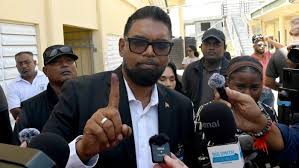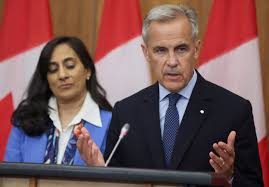Irfaan Ali, the President of Guyana, has been re-elected for a second five-year term after winning the country’s general election held on September 1, 2025.
The announcement was made by the Guyana Elections Commission (GECOM) late Sunday night, confirming that his party, the People’s Progressive Party/Civic (PPP/C), secured 55% of the seats in parliament.
Ali’s victory comes as Guyana experiences a major economic transformation. Since ExxonMobil began offshore oil production in 2019, the country of about 800,000 people has earned over $7.5 billion in oil sales and royalties. This has made Guyana one of the fastest-growing economies in the world.
Under Ali’s leadership since 2020, the government has used the oil money to improve infrastructure, build schools and hospitals, and make university education free. However, challenges remain.
Despite the growing economy, more than half of Guyana’s population still lives in poverty, and many are demanding a fairer share of the oil wealth.
Ali, who is 45 years old and represents the Indo-Guyanese community, now faces growing pressure to ensure the oil profits benefit all citizens, not just a few.
Ali’s main challenger in the election was Azruddin Mohamed, a wealthy businessman often called the “Guyanese Trump” for his populist style. His new party, We Invest in Nationhood (WIN), came second with 24.8% of the vote.
The long-standing opposition party, A Partnership for National Unity (APNU), which has strong support among the Afro-Guyanese population, came third with 17.7% of the vote.
Indian Prime Minister Narendra Modi was among the first world leaders to congratulate President Ali. Both leaders expressed their desire to strengthen the relationship between India and Guyana. The British Embassy also praised Guyana for holding a peaceful and successful election.
Ali’s new term comes during a territorial dispute with Venezuela over the Essequibo region, which makes up two-thirds of Guyana’s land and contains large oil reserves.
Venezuela’s President Nicolás Maduro claims the region belongs to Venezuela and even appointed officials to govern it after a controversial election in May. Meanwhile, Guyana has taken the matter to the International Court of Justice (ICJ), asking the court to uphold an 1899 boundary agreement.
Venezuela rejects the ICJ’s authority and insists on a negotiated settlement based on a 1966 treaty.
The tension is growing, especially after the U.S. military deployed ships to the Caribbean for anti-drug operations. Maduro accused the U.S. of using the deployment to threaten his government, even warning he may declare a “republic in arms” if attacked.
With Guyana’s oil production expected to reach 1 million barrels per day by 2030 (currently at 650,000), the country holds the largest oil reserves per person in the world. The national budget has quadrupled in five years to $6.7 billion, with economic growth at a record 43.6% in 2024.
Now re-elected, President Ali must balance managing huge oil wealth, reducing poverty, and handling international tensions — especially with Venezuela — while keeping his nation stable and united.



